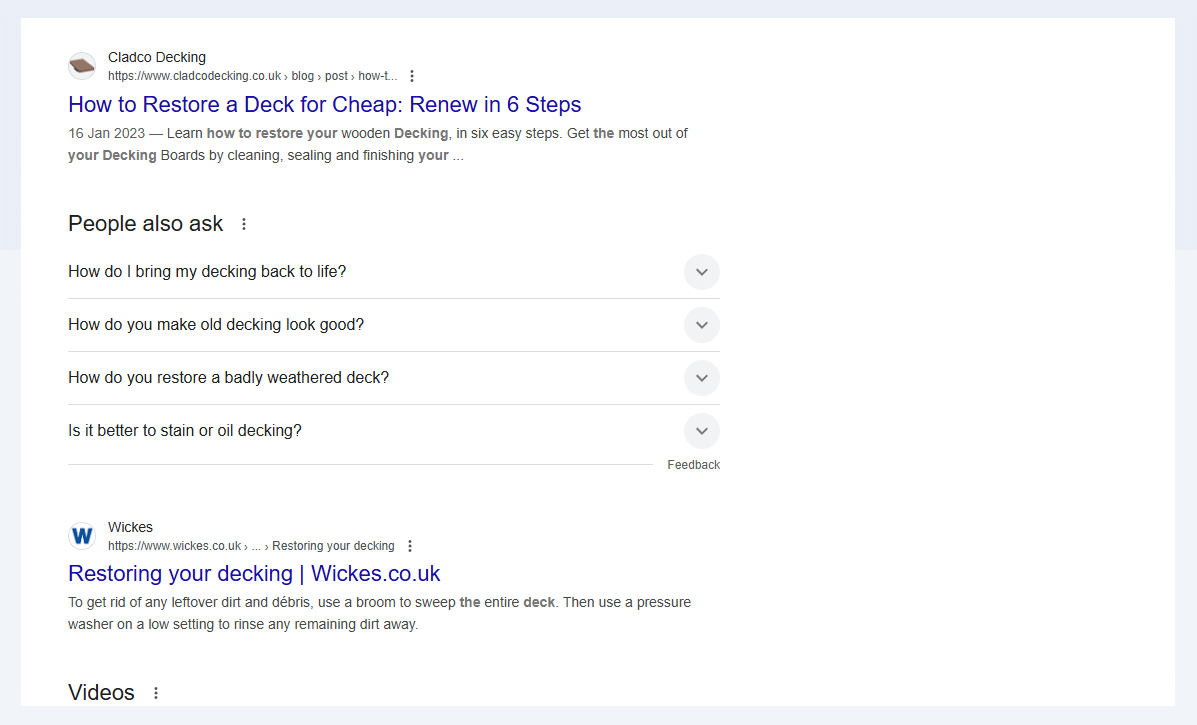
Up until now, optimised, high-quality content, authoritative backlinks, and trend analysis were major factors in how visible companies were in organic search results. And these are still considered to be powerful levers that marketers can use to drive results from organic search traffic.
However, Large Language Models, like ChatGPT, have significantly changed how users look for information. For instance, a current search on Google for the phrase “how to restore my decking” gets you these results:

As you can see, a page from Wickes.co.uk appears among the top results. This isn’t by chance— they have likely invested significantly into keyword research, content creation, and link building to drive users to that specific page and product pages where users can buy items related to deck restoration. This is a classic and widely used content marketing strategy for ecommerce.
However if use the same phrase in ChatGPT, it will provide a clear, straightforward instructions in seconds without forcing the user to sift through multiple websites to find the best results. The user can then refine their query for more specific information.
In this case OpenAI is not only taking the market share from Google by bypassing both their organic and paid search results, but also impacting the companies who rely on search results to drive traffic and sales from their sites.
And this is backed up by statistics: According to eMarketer, Google's share of search advertising revenue in the United States is expected to decline from almost 90% to 54% in the coming months.
In early 2024 Google released a detailed guide about how AI content will be indexed and treated by Google. To summrise, so long as the published content matches the basic Experience, Expertise, Authoritativeness, and Trustworthiness (E-E-A-T) standard, Google will neither favor nor discriminate against content generated by GenAI.
In other words, while the automated data will not impact rankings directly, competition is likely to increase due to companies gaining the ability to scale up their content writing.
While It’s impossible to predict how Generative AI will alter search engines and SEO in the long term, we predict that traditional searching and browsing will have a reduced but still prominent role. Let’s explore the reasons for this:
Content writers need to raise the bar and produce content that AI models are less likely to replicate, such as in-depth analyses and unique insights. Another strategy is to offer value through interactive tools and elements – for example a Deck Restoration Cost Calculator. Such strategies can help to offset provides value that automated summaries can’t match.
Rather than aiming to dominate every keyword, focus on producing content that genuinely resonates with users. High-quality, targeted content is more likely to attract organic traffic and build trust, even in an AI-driven environment.
Ironically, while content marketing is bleeding off some of its relevance, LLMs have also enabled companies to dramatically scale up their content creation efforts. While an LLM still cannot compete with highly skilled writers in terms of quality, it’s going to be hard for companies marketing efforts to remain competitive while still relying purely on hand-written content. Already we are seeing a hybrid approach becoming the trend: Skilled writers rely on LLMs to write a first draft which they then refine and improve up to their standard.
Generative AI is undeniably reshaping the marketing landscape, offering both opportunities and challenges. While it empowers companies to scale content creation and improve efficiency, it also disrupts traditional SEO strategies and changes how consumers interact with information online.
To stay competitive, marketers must adapt by focusing on creating unique, high-value content and leveraging innovative tools to engage users in ways that AI cannot fully replicate. By balancing the use of AI-driven efficiencies with human creativity and expertise, brands can maintain their relevance and build trust with their audience.
The rise of Generative AI does not signify the end of SEO, but rather an evolution. As search engines and user behavior continue to adapt, businesses that remain agile and forward-thinking will find ways to thrive in this dynamic environment. The key lies in embracing AI as a complement to human efforts, rather than viewing it solely as a threat.